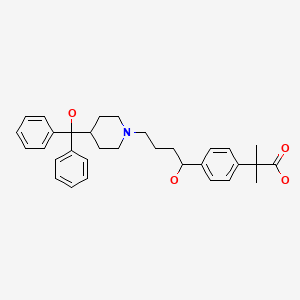Attribution Statement: LactMed is a registered trademark of the U.S. Department of Health and Human Services.
NCBI Bookshelf. A service of the National Library of Medicine, National Institutes of Health.
Drugs and Lactation Database (LactMed®) [Internet]. Bethesda (MD): National Institute of Child Health and Human Development; 2006-.
CASRN: 83799-24-0

Drug Levels and Effects
Summary of Use during Lactation
Because of its lack of sedation and low milk levels, maternal use of fexofenadine would not be expected to cause any adverse effects in breastfed infants. Fexofenadine might have a negative effect on lactation, especially in combination with a sympathomimetic agent such as pseudoephedrine.
Drug Levels
Fexofenadine is an active metabolite of terfenadine.
Maternal Levels. Milk levels have not been measured after fexofenadine administration. However, after 60 mg every 12 hours orally of its parent compound, terfenadine, peak steady-state fexofenadine milk levels averaged 41 mcg/L (range 23 to 60 mcg/L). Based on the data on drug passage into breastmilk in this study and the typical serum levels found after fexofenadine administration, an exclusively breastfed infant would receive less than 0.1% of the weight-adjusted maternal dosage of fexofenadine.[1]
Infant Levels. Relevant published information was not found as of the revision date.
Effects in Breastfed Infants
In one telephone follow-up study of 25 infants exposed to the fexofenadine's parent drug terfenadine, 3 mothers reported irritability in their infants. None of the reactions required medical attention.[2]
Effects on Lactation and Breastmilk
Antihistamines in relatively high doses given by injection can decrease basal serum prolactin in nonlactating women and in early postpartum women.[3,4] However, suckling-induced prolactin secretion is not affected by antihistamine pretreatment of postpartum mothers.[3] Whether lower oral doses of antihistamines have the same effect on serum prolactin or whether the effects on prolactin have any consequences on breastfeeding success have not been studied. The prolactin level in a mother with established lactation may not affect her ability to breastfeed.
Alternate Drugs to Consider
References
- 1.
- Lucas BD Jr, Purdy CY, Scarim SK, et al. Terfenadine pharmacokinetics in breast milk in lactating women. Clin Pharmacol Ther. 1995;57:398–402. [PubMed: 7712667]
- 2.
- Ito S, Blajchman A, Stephenson M, et al. Prospective follow-up of adverse reactions in breast-fed infants exposed to maternal medication. Am J Obstet Gynecol. 1993;168:1393–9. [PubMed: 8498418]
- 3.
- Messinis IE, Souvatzoglou A, Fais N, et al. Histamine H1 receptor participation in the control of prolactin secretion in postpartum. J Endocrinol Invest. 1985;8:143–6. [PubMed: 3928731]
- 4.
- Pontiroli AE, De Castro e Silva E, Mazzoleni F, et al. The effect of histamine and H1 and H2 receptors on prolactin and luteinizing hormone release in humans: Sex differences and the role of stress. J Clin Endocrinol Metab. 1981;52:924–8. [PubMed: 7228996]
Substance Identification
Substance Name
Fexofenadine
CAS Registry Number
83799-24-0
Drug Class
Breast Feeding
Lactation
Antihistamines
Nonsedating Antihistamines
Disclaimer: Information presented in this database is not meant as a substitute for professional judgment. You should consult your healthcare provider for breastfeeding advice related to your particular situation. The U.S. government does not warrant or assume any liability or responsibility for the accuracy or completeness of the information on this Site.
- User and Medical Advice Disclaimer
- Drugs and Lactation Database (LactMed) - Record Format
- LactMed - Database Creation and Peer Review Process
- Fact Sheet. Drugs and Lactation Database (LactMed)
- Drugs and Lactation Database (LactMed) - Glossary
- LactMed Selected References
- Drugs and Lactation Database (LactMed) - About Dietary Supplements
- Breastfeeding Links
- PubChem SubstanceRelated PubChem Substances
- PubMedLinks to PubMed
- Fexofenadine - Drugs and Lactation Database (LactMed®)Fexofenadine - Drugs and Lactation Database (LactMed®)
Your browsing activity is empty.
Activity recording is turned off.
See more...
